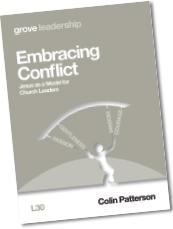How to handle conflict in your church like Jesus
Conflict in churches can be horrible. We are, after all, supposed to be able to get on with each other, and most of the time we do. Relationships can be close, friendships warm, trust absolute. When that's broken, it's really hard to deal with.
Sometimes these conflicts arise because of human cussedness, otherwise known as original sin. At other times, though, there are deeper-rooted issues about the nature of the gospel and the mission of the church in a particular place. Inevitably, the minister becomes the focus of disagreement as he or she is tasked (as the congregation sees it) with keeping the show on the road.

How to cope? Even the title of Colin Patterson's Grove booklet, Embracing Conflict: Jesus as a Model for Church Leaders, is a challenge: many pastors would rather run from conflict than embrace it.
But Patterson – who before retirement this year specialised in mediation, consultancy and training church leaders in how to handle conflict – uses the life of Jesus to reflect on how we can do conflict better. He writes from personal experience and is honest about the cost of this side of ministry. 'What makes it particularly difficult is the emotional pressure that I feel under, maybe that others deliberately exert upon me as a leader....I know lots of relevant principles, but what will they look like worked out in sleepless nights, sweat and tears, here and now?'
We hear you. It's easy to theorise, but as von Moltke remarked, no plan survives contact with the enemy. But Patterson's hard-won experience has a lot to offer those who are in the middle of that fray.
He suggests four different models of leadership style – the standard-bearer who prizes passion, the enabler who prizes gentleness, the teacher who prizes wisdom and the director who prizes courage. He has more to say about them all and acknowledges that we'll draw on any of these in different contexts, but says we'll tend to default to one. Each of the gospels, he says, speaks to one of these four types, and he suggests reading through the one that corresponds to our own leadership style and putting ourselves in the shoes of Jesus as he appears in it.
Patterson notes that Jesus has no simple pattern in his approach to conflict, and this is the most interesting part of his argument. 'In Jesus I see someone whose inner question seems always to be, "What is needed at this moment?" This suggests I should resist any approach to conflict that smacks of simply having a few good tricks up my sleeve.' But that's not to say we can't learn from what Jesus does.
We see him navigating 'everyday tensions', resisting the 'scripts' he's presented with. He resists being blamed when his parents lose him in Jerusalem as a 12-year-old; he resists the instantaneous urge to help at the wedding in Cana; he declines the 'alliance' script where he's invited to take sides in a dispute about inheritance. Reflecting on these provides with with tools that we too can use for resisting conventional scripts – though, Patterson says, 'they may not avail much without also having something of the underlying poise that Jesus brings to the encounters'.
As well as everyday tensions, though, we'll sometimes meet real concerted hostility – and here too we can learn from Jesus. The key, Patterson says, is to see how he engages with the 'web of power' with which he's confronted. Sometimes it's appropriate to contest the space; sometimes it's appropriate to make more room. And ultimately, he surrenders to the 'web'. This, says Patterson, 'has a shocking significance for us. For we have no example of Jesus deliberately bringing concerted hostility to a head, except in the case where he intended to bear the pain himself...If I wish to take Jesus as a model of pointed rebuke to the powerful, then I should expect to do so sparingly, with a specific sense of call, and ready to be a loser by all conventional scripts.' He does not, perhaps, make as much of this insight as he might; after all, leaders, in the (secular) narrative that's infected so much Christian discourse about this subject, are winners; Jesus, at the crucial point of his ministry, was not.

One of the strengths of this short book is its stress on being rather than doing. The inner life is the key to the external. So, 'being like Jesus means attending to things of the heart', says the author. Among these are open, trusting relationships, face to face encounters and honesty about issues. There's also to be an awareness of the shadow side of leadership – destructive traits like bitterness, timidity, contempt and force. 'Seek the corresponding constructive traits regularly in prayer, if you are to grow more like Jesus,' says Patterson.
I admit to not being a fan of Christian books about leadership. All too often they're thoroughly secular, with a veneer of Christianity to appeal to the worried clergy market. But there's real wisdom in much of what Patterson says – and all of us, clergy or not, will face conflicts in church sometimes. Perhaps we can learn to embrace it.
'Embracing Conflict: Jesus as a Model for Church Leaders' is available from Grove Books, price £3.95.
Follow Mark Woods on Twitter: @RevMarkWoods











